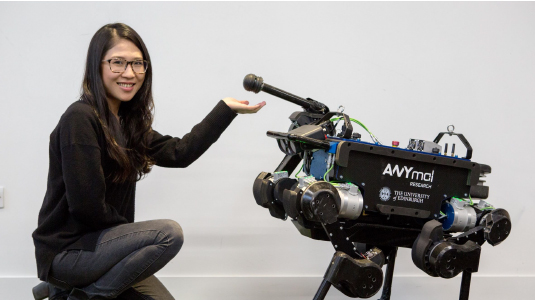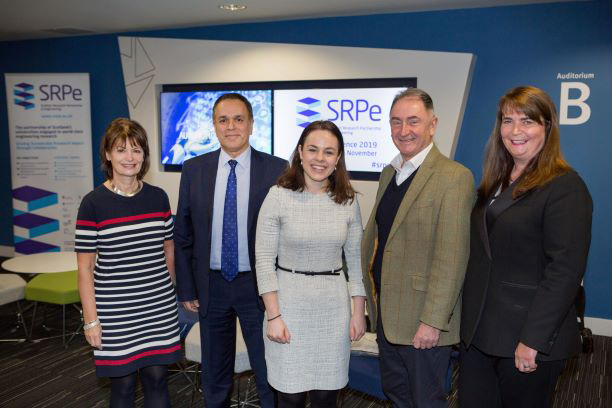SFC news published since 2018. See SFC archived content for earlier news articles.
Dr Caroline Cantley, Executive Director of the Scottish Research Partnership in Engineering (SRPe) re-caps SRPe’s inaugural conference.


One of eight ‘research pools’ established by the Scottish Funding Council (SFC), the Scottish Research Partnership in Engineering (SRPe) is the strategic partnership of ten Scottish universities, working collaboratively with industry and government to build on the nation’s engineering excellence.
Last week we hosted our inaugural annual conference. It was a fantastic and fast-paced event with a line-up of inspiring speakers, including SRPe Chair and Principal and Vice-Chancellor of the University of Strathclyde, Professor Sir Jim McDonald who was also recently elected as President of the Royal Academy of Engineering, the first Scot to hold this prestigious post.
Our keynote speaker Kate Forbes, Minister for Public Finance and Digital Economy talked about the ‘triple helix’ of academia, industry and the public sector working together and the importance of that collaboration, and the ability it gives us to leverage external funding.
Ms Forbes also launched the new ‘Scottish Industry Directories’ portal which offers a gateway to some 4,000 companies, academic organisations, research centres and trade associations in Scotland.

Photo caption: Prof Dame Anne Glover, Dr Hamid Mughal OBE, Kate Forbes MSP, Prof Sir Jim McDonald, Dr Caroline Cantley.
Professor Dame Anne Glover, President of the Royal Society of Edinburgh gave a very thought-provoking speech highlighting that Scotland is leading the way when it comes to collaboration between academic institutions and industry, making it easier for ‘curious minds’ to find each other – but also challenged the audience to imagine the creativity that could be unleashed if only we could tap into everyone’s talent when it comes to engineering, noting that women are still under-represented in the field.
Dr Hamid Mughal OBE, Director of Global Manufacturing for Rolls Royce gave a very insightful speech from the industry perspective highlighting that earlier waves of technology had enabled us to rely less on our muscles and think more with our heads, and how advances in the next wave of automation and artificial intelligence would free us to think less with our heads, and more with our hearts – vital to key concepts like creativity and collaboration.
The Minister then had the opportunity to meet with some of our industry doctorate students and their academic and industry supervisors at a poster exhibition. As a key delivery partner of the National Manufacturing Institute Scotland (NMIS), and based on an investment by SFC, SRPe is delivering the NMIS Industry Doctorate Programme (NMIS-IDP) which is the first skills programme delivered within NMIS under its Manufacturing Skills Academy.
The programme is comprised of 30 industry doctorate projects designed specifically around industry needs, and provides a pathway for Scottish universities to collaborate on skills provision and the delivery of solutions to industry challenges and opportunities in advanced and digital manufacturing. The wide range of projects being delivered under this programme demonstrates Scotland’s potential to be a global leader in engineering and manufacturing technology.
Also on display were a number of research exhibits showcasing the broad spectrum of leading-edge engineering research being delivered across Scotland’s universities.
These included virtual reality simulation software to safely train oil rig workers (University of the West of Scotland), pioneering blood salvage technology transforming the way major surgery is carried out (University of Strathclyde), and ‘The Flying Podsman’ fairing from the only UK team to reach the Hyperloop challenge finals three years in a row (University of Edinburgh).
Guests were invited to interact with ANYmal (University of Edinburgh), a quadruped robot developed for use in difficult terrain and for safety purposes when inspecting offshore platforms. The TAU Racing team (University of Aberdeen) showcased their racing car, designed and manufactured by students to compete within the Annual Formula Student competition at Silverstone.
Throughout the rest of the day, speakers from partner institutions and organisations shared their work on a range of opportunities and challenges. It was fascinating for the audience not only to hear of this work but also the questions from other audience members. Humans will have to learn to trust robots as they take over more jobs, particularly hazardous ones, but as one person asked, how will robots be able to ‘trust’ humans, for example, not to perform dangerous or illegal activity?
It may seem far-fetched but these are the kinds of questions that will need to be answered as engineering research and innovation continue to play a critical role in shaping our nation’s future success, particularly as we enter the digital era.
Our SFC funded programmes supporting European research collaboration-building and postgraduate and early career researcher development were also featured, along with the Engineering and Physical Sciences Research Council funded Inclusion Matters projects on equality, diversity and inclusion underway in Scotland.
The SRPe universities comprise a talented engineering research community of more than 1,100 academics, 5,500 postgraduate students and 13,500 undergraduates. We relish the exciting opportunities ahead and we will continue to work in close collaboration with industry and government to build upon Scotland’s research excellence, to enhance our international competitiveness and address key skills gaps in engineering and related sectors.

